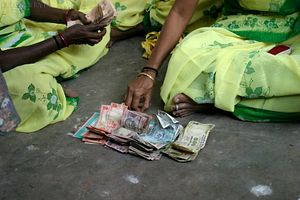India’s bid to stem widespread corruption is coming under increasing scrutiny amid heightened criticism of a scheme to purge the country of illicit cash and concerns over a crackdown on shell companies suspected of financial crime.
Prime Minister Narendra Modi swept to power in 2014 vowing to get to grips with untaxed and illegally obtained cash, which is undermining the Indian economy.
The government has made significant strides in its efforts to identify shell companies suspected of being used for tax evasion and money laundering. But questions have been raised about the execution of some elements of the campaign. Commentators have been critical of the lack of clarity over criteria used in investigations, after several public companies were identified as shell entities. One possible problem is that there is no clear definition of what constitutes a shell company in Indian law.
In addition, government critics have recently railed against demonetization – an attempt to remove undeclared money and the proceeds of corruption from the financial system. They claim it has merely helped criminals as well as corrupt businessmen and officials to launder illicit wealth.
While the government has been probing shell companies for several years, it stepped up its investigations after officials noticed late last year an upsurge in non-trading firms depositing cash in banks, in an apparent attempt to conceal its origin. The suspicious transfers took place at the height of the demonetization program, during which high-value notes had to be deposited in banks or exchanged for new currency before they were removed from circulation.
Modi assigned a team of senior law enforcement and tax officials to launch a major swoop on shell companies, which have no active operations. Officials believe they are among the key vehicles for fraud and embezzlement in the country. Last month, Modi said the government had identified 300,000 of these firms – 400 run from the same address – and cancelled the registration of over half of them. There has been no let-up in the campaign. In the latest moves, this month the bank accounts of around 200,000 shell companies were frozen and over 100,000 directors were listed for disqualification due to their association with such entities.
While the crackdown on the abuse of corporate structures for the purposes of financial crime is seen by some as long overdue, there has been concern about its rigor and precision. That came to a head early last month when a number of public companies successfully challenged their inclusion on a government list of 331 suspected shell companies, almost half of whom are actively trading. Their names were passed to the capital markets regulator, the Securities and Exchanges Board of India (SEBI), which authorized stock exchanges to take action. As a result, share-trading in the companies, which could face delisting, has been severely restricted pending government investigations into their operations.
Most of the companies that challenged their inclusion on the blacklist managed to overturn the SEBI sanction. Although they have been permitted to trade as the probes proceed, some have seen significant falls in their market valuations. In the aftermath of the affair, the authorities have been criticized for not properly investigating whether there was sufficient reason to suspect the targeted companies of being shell entities. Some media said grounds for the firms’ inclusion on the government list were insufficiently clear. Others argued that the companies should have been given an opportunity to address the concerns that had been raised before the trading ban was imposed.
Criticism of the government’s bid to improve corporate governance has been mild compared to recent scathing assessments of demonetization. The barbs came out late last month when India’s central bank revealed that 99 percent of the 500- and 1,000-rupee notes removed from circulation were returned to banks between the launch of the initiative on November 8 and the December 30 deadline. Opposition politicians and some economists have been quick to pronounce the scheme a failure because those hoarding “black money” had clearly managed to deposit or exchange their funds without arousing too much suspicion. The government had hoped they would be left with “worthless pieces of paper.”
Media reports suggest that a variety of money-laundering schemes were set up after demonetization began, allegedly enabling many corrupt Indians to clean their tainted cash undetected. These reportedly ranged from the use of shell companies, flying illicit cash to states exempt from government restrictions to getting domestic staff and poor Indians to deposit or exchange the notes. Anand Sharma, a senior Congress Party representative, captured the mood of Modi critics when he declared demonetization “the biggest scam,” accusing the government of helping to make illegal money legal.
In their defense, the authorities say demonetization will increase the tax base, improve tax collection and help India transition from cash-based to digital transactions. They also insist that the alleged laundering of illicit funds through the banking system is being probed. Currently, investigations are focusing on some 1.8 million bank accounts with suspicious cash deposits as well as what officials describe as 200 “high risk clusters” of people.
Nonetheless, there are indications that the controversial program, which caused significant business disruption, has harmed the economy. The shortage of cash is reported to have contributed to growth falling to its lowest level for three years, while demonetization-related costs are said to have accounted in part for a substantial drop in the dividend the central bank pays the government.
The authorities insist that the impact on the economy will be short-term, far outweighed by the future benefits of a more transparent financial system. Whether or not that turns out to be the case, officials will need to better execute reforms if they are to keep the business community and ordinary Indians onside.
Yigal Chazan is an Associate at Alaco, a London-based business intelligence consultancy.

































